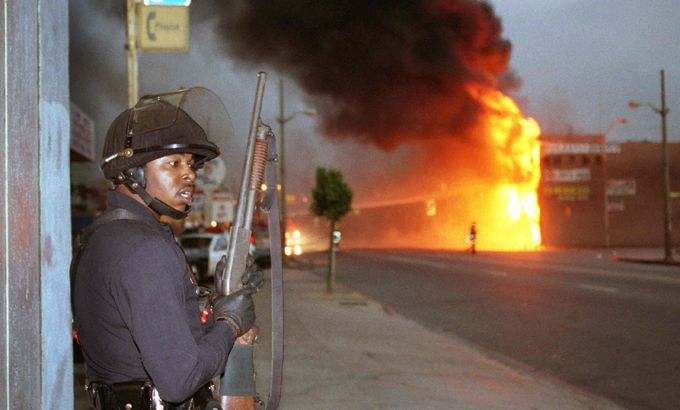
What has changed since the LA riots?
Twenty years after the Rodney King verdict, we ask if black Americans are still subject to racial profiling.
It was a verdict that outraged the African American community in Los Angeles. The acquittal of four LA police officers for the beating of a young black man, Rodney King, 20 years ago, split the city’s racial divide wide open and set off a wave of race riots in Los Angeles. Some said the verdict was like lighting the fuse of a bomb.
|
“People just don’t say ‘one day I’m going to start a riot’. It doesn’t happen this way. It’s a long train of conditions and abuses and pent-up resentment and that’s what we saw.“ – Earl Ofari Hutchinson, a political analyst and author |
Years of racial tension boiled over and the wave of looting and violence that followed shocked many in the US and around the world. The epicentre of the riots was the notorious neighbourhood of South Central Los Angeles. The six days of unrest saw first the California National Guard and then US Marines deployed on the streets of South Central LA in an attempt to bring calm. Dozens of people died and thousands more were injured.
Keep reading
list of 4 items‘It feels personal’: Residents fight Melbourne tower block demolition plan
‘Children of the Ganges’ — The boatmen of India’s Varanasi
US senators call on Biden to sanction Sudan’s RSF over human rights abuses
The LA riots brought into sharp focus the actions of the Los Angeles Police Department and its interactions with the city’s ethnic minorities. Race relations throughout the country also came under the spotlight once more.
And recent cases such as the shooting dead of black teenager Trayvon Martin prove that, 20 years on, the issue is still a source of tension.
What fuelled the outrage that led to the riots two decades ago? Could it happen again? What has changed between US police forces and the country’s minority groups? What progress have the police and the US made to heal the country’s race wounds?
Joining Inside Story Americas to discuss this are: Hubert Williams, the president of the Police Foundation and one of the special advisers to the LA police commission in the wake of the riots; Horace Cooper from Project 21, a group that promotes the views of African American conservatives; and Earl Ofari Hutchinson, a political analyst and author who specialises in race and politics.
|
“We have race problems in America, but all Americans don’t have race problems. Some Americans get along quite good with everybody. But there are Americans that have these racial issues. When they put on a uniform and a badge it gives them a sense of power, they can do things that other people can’t do. And that’s why there’s got to be a strict accountability …. Police have to be held accountable when they violate rules, when they breach the standards of the law.” Hubert Williams, the president of the Police Foundation |
RODNEY KING AND THE TOLL OF THE LA RIOTS:
- Rodney King was stopped by the Los Angeles Police on March 3, 1991
- He was suspected of driving under the influence of alcohol
- LA police officers were videotaped beating him after the traffic stop
- Four police officers were charged with assault over the King beating
- There were no black jurors in the jury that acquitted the four police officers
- The acquittal sparked days of rioting and unrest in Los Angeles
- The violence started on April 29, 1992 and lasted for six days
- Witnesses say the police withdrew during the LA riots
- California National Guard troops were deployed to keep order in LA
- A state of emergency was declared in LA during the 1992 riots
- Property damage was estimated at more than $1bn
- According to the LA Times 63 people died during the violence and more than 2,000 were injured
- 28 African Americans were killed, 19 Latinos, 14 whites and two Asians
- More than 12,000 people were arrested, about half of whom were Latinos
- Rodney King was awarded $3.8m in a civil lawsuit against the Los Angeles Police Department (LAPD)
- Significant reforms for the LAPD began in 2002 and implemented changes were suggested by community groups